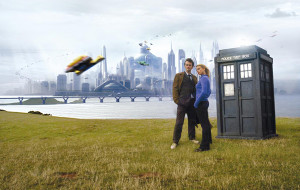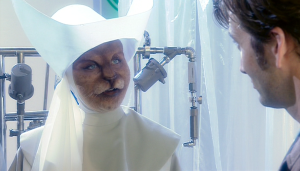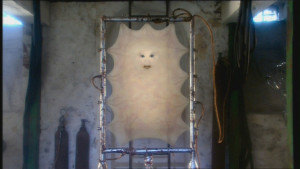 Episode 2 of season 2 offers what science fiction does best–not only giving us a world we’ve never been in before, but using this new setting to explore questions already prominent in the human mind. In the case of “New Earth,” we’re visiting the topic of death. More specifically, our fear of death and what we’re willing to do to stave off the unknown. Inevitably, this takes us into the realm of ethics to consider the value of human life and our treatment of one another.
Episode 2 of season 2 offers what science fiction does best–not only giving us a world we’ve never been in before, but using this new setting to explore questions already prominent in the human mind. In the case of “New Earth,” we’re visiting the topic of death. More specifically, our fear of death and what we’re willing to do to stave off the unknown. Inevitably, this takes us into the realm of ethics to consider the value of human life and our treatment of one another.
When the Doctor and Rose obey a summons on the psychic paper to a hospital ward in New New York, they accidentally run into a former acquaintance from the series. This someone is the unfortunate representation of our current version of humanity, now billions and billions of years extinct: Cassandra. She calls herself “the last human,” though she’s had so many preservative procedures to cheat death that she hardly resembles a human anymore. No one fears death like Cassandra. She unabashedly believes that her life is more valuable than anything or anyone else and is willing to hurt or kill as many people as it takes (in this case, the Doctor and Rose) to extend her life even a moment longer.
 A thread of this ideology is present on a much larger scale in the episode. The Doctor discovers that the Sisters of Plenitude (humanoid feline nuns that run the hospital) are creating human specimens as “lab rats” to test medicines used to heal–even save the lives of–citizens of their city. They speak righteously about their work, arguing that the test subjects are merely organic matter, not actual human lives. When it is discovered that the test subjects have indeed developed consciousness, the Sisters argue that it is a worthy sacrifice because of those being saved by the medicines created through the process.
A thread of this ideology is present on a much larger scale in the episode. The Doctor discovers that the Sisters of Plenitude (humanoid feline nuns that run the hospital) are creating human specimens as “lab rats” to test medicines used to heal–even save the lives of–citizens of their city. They speak righteously about their work, arguing that the test subjects are merely organic matter, not actual human lives. When it is discovered that the test subjects have indeed developed consciousness, the Sisters argue that it is a worthy sacrifice because of those being saved by the medicines created through the process.
Doctor: “These people are alive!”
Matron Casp: “Think of those humans out there, healthy and happy because of us!”
Doctor: “If they live because of this, then life is worthless.”
Cassandra and the Sisters have very different aims–one is very selfish, the other noble–but both must assign varying levels of value to people, prioritizing some over others, in order to achieve their end goal. The tone the episode takes towards both of them is one of righteous indignation, clearly identifying that what they are doing is wrong. Are we in a place to judge either of these characters’ motives or methods? In an era that affords humanity any number of ways to prolong life, consider the lengths we are willing to traverse to accomplish this goal. Can we look within and honestly say that we don’t prioritize our life over another’s when we find our existence threatened? Observing our world, full of murder and poverty and war, I would heartily argue that the answer is no. And the problem is in fact much worse: humans turn on one another not just to protect our lives, but to protect something as simple as our comfort.
Whatever else we can say about these characters, especially Cassandra, they are certainly honest–willing to follow their beliefs out to a logical conclusion. What is the inevitable result of our own ideology of self-preservation? Are we willing to admit the answer to that question?
 From the Christian perspective, death is not to be feared. Its power has been conquered so that it is not the end of us, but leads to eternity, wherein lies a redeemed, restored version of the world that we both enjoyed and struggled through. Jesus Christ himself has shown us by example the importance of both living and dying well. Despite the inevitability of his death, he lived generously and boldly, knowing that Earthly life is just the beginning of eternity. He used the brief span of time he had on our planet to make a great impact in individual lives–rich, poor; young, old; accepted and outcast. It can be the same for us. Knowing the glorious beyond allows us to live selflessly, not prioritizing our lives to the detriment of our neighbor, but sacrificing our comfort, even our very lives, because what we have on Earth is merely a foretaste of the eternal. How aptly named is this episode, conjuring images of a future “new heaven and new earth” where all lives are given equal chance, freedom, and worth; where we live into the reality that there is more than enough to go around, and we don’t have to look out for ourselves.
From the Christian perspective, death is not to be feared. Its power has been conquered so that it is not the end of us, but leads to eternity, wherein lies a redeemed, restored version of the world that we both enjoyed and struggled through. Jesus Christ himself has shown us by example the importance of both living and dying well. Despite the inevitability of his death, he lived generously and boldly, knowing that Earthly life is just the beginning of eternity. He used the brief span of time he had on our planet to make a great impact in individual lives–rich, poor; young, old; accepted and outcast. It can be the same for us. Knowing the glorious beyond allows us to live selflessly, not prioritizing our lives to the detriment of our neighbor, but sacrificing our comfort, even our very lives, because what we have on Earth is merely a foretaste of the eternal. How aptly named is this episode, conjuring images of a future “new heaven and new earth” where all lives are given equal chance, freedom, and worth; where we live into the reality that there is more than enough to go around, and we don’t have to look out for ourselves.
“New Earth” is full of redemptive moments, not the least of which is when Cassandra is finally being able to surrender to her own death. This attitude shift is made possible only because she is forced to put herself into the body and mind of someone else (quite literally). Understanding the value of the lives around her does not cause her own worth to diminish–a fear that has driven her actions for billions of years–but actually helps her to see the beauty and fullness of her life. She finds rich gain in the thing she had always feared as ultimate loss. The last scene is a beautiful representation of this: it shows us Cassandra, whom we have only seen as a single piece of stretched skin, restored to her whole, true body once again.

